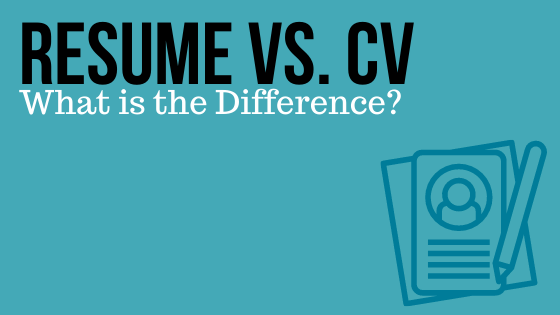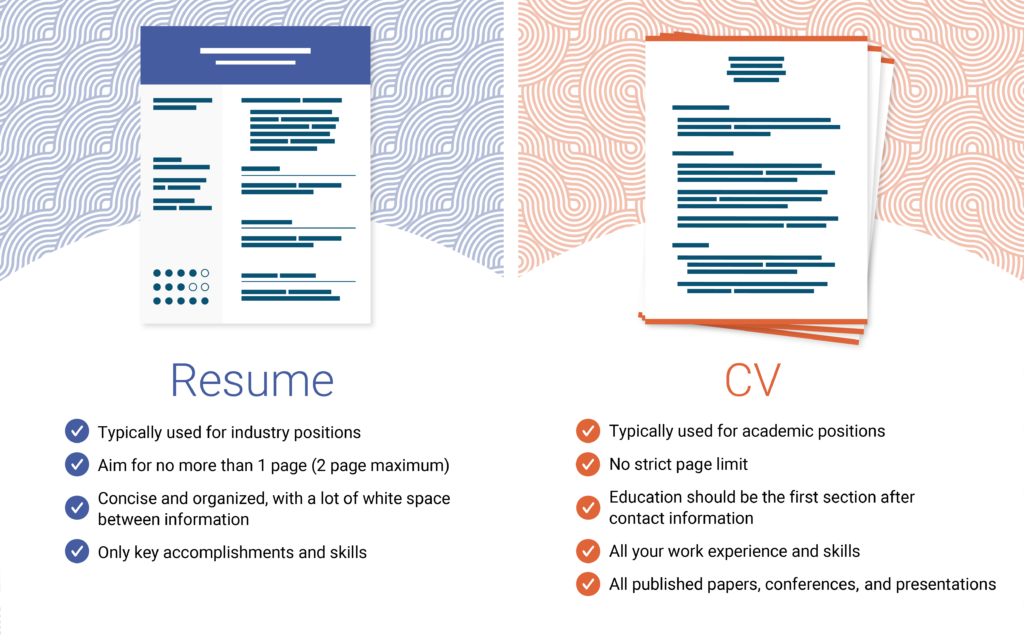Today’s guest blog is written by Sophie Mancha, a former global marketing intern with Promega. She is in her 4th year as a PhD candidate in the Biomedical Engineering Department at the University of Wisconsin-Madison, studying pancreatic cancer. Reposted from the Promega Connections blog with permission.
Whether you are applying for a scholarship or trying to land a position in a research lab, there are plenty of decisions to make. Arguably, the most critical consideration is what documents to include to showcase that you are the right person for the job. Specifically, should you be preparing a curriculum vitae (CV) or a resume? What exactly is the difference?
You should start by thinking about the field you are applying to. Is it academia or industry? Both have significant differences, therefore the resume or CV you are preparing will have different objectives. For example, academia is driven by research, discovery and being independent, whereas industry usually depends on team collaborations, is more business-oriented and is focused on product development with strict timelines. Of course, these generalizations vary for each position, but understanding the field you are applying to will help you narrow the motivation of your application documents.
When Should I Use a Resume?
A resume is a short document highlighting your previous work experience and skills useful for the specific position you are applying to. Resumes are typically preferred when applying to an industry position. It is important to keep in mind that each employer, admissions officer or lab will have their own idea and expectations for what should and should not be included in a resume; therefore, you may receive conflicting advice.
There are some general rules that most people will agree on that can help you successfully build your resume. For example, unless otherwise stated in the application, a resume should be no longer than a single page, with a maximum of two pages if you have had an extensive career. Reviewers typically have many resumes to go through and will not spend much time examining them. They are likely to skim the document very quickly, only looking for key accomplishments that stand out to them.
This makes it important to emphasize your greatest skills and achievements specific to the position, rather than include a comprehensive list of all your skills, which can leave the reviewer losing interest as they try to decipher what makes you stand out. Make it easy for the reviewer to skim and find your greatest strengths by having an easy-to-read layout including headers, sub-headers, bullet points and plenty of white space to reduce distractions.
Your resume should begin with your personal information including your name, address, telephone number and email. Next you may want to add an objective statement, which typically consists of a couple of sentences that describe your career goals and purpose for submitting your resume. While some think this is an outdated practice and takes up unnecessary space, others argue the objective statement allows the reviewer to quickly examine if the applicant is applying for the correct job and knows what they want. That can be useful if you are transitioning to a different field of work. One way to decide whether or not to include the objective statement is to determine if you have enough space. If you are reaching your one-page limit, then leave the objective statement out.
The rest of the resume should feature your experience, education and skills. The order of these sections will depend on where you are in your career and how much experience you have. Generally, start with experience, followed by education, and end with your skills. All of these should list items in descending order from most recent to oldest. If you are a recent graduate and do not have much work experience, you may consider listing your education first and adding more about your leadership roles, awards and publications. Either way, a resume is unique to you and should be tailored to highlight your greatest strengths.
When Should I Make a CV?
On the other hand, a CV is typically used when applying to an academic position and is not limited in length. It should include all your skills and work experiences, not just those that are most relevant to the job position. A CV includes the same basic topics as a resume, such as personal contact information, experience, education and skills; however, it should also include research, publications, presentations and conferences. Finally, while education may not be the first section in a resume, a CV should always start with your education.
Important Similarities
Overall, a resume is just a condensed version of a CV. Although there are varying opinions about the best way to write a resume or CV, both should include language reflecting the application form, use a standard black font and avoid using colors or patterns that distract from what is written. Lastly, and potentially most important, use spellcheck. After you have triple checked your spelling, check again and have at least one other person proofread. This is the easiest way for a reviewer to instantly reject you, regardless of your qualifications. Having a resume or CV that is clear and error-free demonstrates your attention to detail and professionalism and can potentially put you ahead of other applicants with similar qualifications.
It takes time and several revisions to create a resume or CV, so be patient with the numerous edits you will have to go through to create an effective resume or CV. Keep in mind, the bullet points you are creating are not just a list, but actual accomplishments that took hard work to achieve, so do not be afraid to brag about yourself.
WOULD YOU LIKE TO SEE MORE ARTICLES LIKE THIS? SUBSCRIBE TO THE ISHI BLOG BELOW!
SUBSCRIBE NOW!



